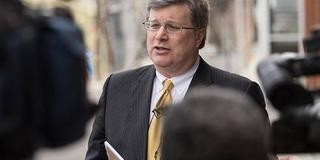Memphis Mayor Jim Strickland may have generated more buzz than he intended this week by announcing his endorsement of Republican Brent Taylor in the race for state Senate District 31.
Taylor, a former City Councilman and County Commissioner who recently resigned as chairman of the Shelby County Election Commission in order to make the state Senate race, is a Republican and drew a petition to run in the May 3 GOP primary, as did four other Republicans.
A single Democrat, Ruby Powell-Dennis, has drawn a petition to run as well.
The outcry regarding Strickland’s act, such as it was, came from rank-and-file Democrats, including Powell-Dennis herself, and focused on the fact that Strickland, a nominal Democrat who once chaired the Shelby County party, had apparently ignored Powell-Dennis’ bid to cross party lines and endorse Republican Taylor.
Powell-Dennis has subsequently called for the local and state Democratic Party to decertify the bona fides of Strickland as a Democrat — an action that would have significance only if Strickland, who has twice been elected mayor in non-partisan elections, should run for office in a partisan election as a Democrat. The mayor has indicated he has no such plans.
Strickland’s venture across party lines is not a novel thing for nominally Democratic mayors of Memphis. Former Mayor Willie Herenton was an avowed supporter of Republicans Don Sundquist and Lamar Alexander for statewide offices.
Steven Reid, a political consultant who has numbered Strickland among his clients in the past, said he thought Strickland’s endorsement was probably based on his judgments that the district was overwhelmingly Republican in its demographics, and that Taylor was the Republican who would do the best job for Memphis among the several GOP candidates. Reid stressed that he had not discussed the matter with Strickland and was not speaking on the mayor’s behalf.
Reid said he had seen a statistical breakdown of the newly reconfigured District 31 which indicated that Republican Donald Trump had won 58 percent of its precincts in the 2020 presidential race, whereas Trump had run virtually even with Hillary Clinton in the precincts that comprised the district in 2016. “It’s much more Republican now than it was then,” Reid said.
While Strickland insists on his continuing Democratic allegiance when pressed on the matter, he has not played an active role in party affairs in recent decades, and, even when he was party chair briefly in the ’90s, he identified himself as a moderate and took positions — being pro-life on abortion, for example — that ran counter to the public platforms of the Democratic Party.
Meanwhile, Strickland’s endorsement has measurably increased state Senate candidate Taylor’s backing from prominent public figures. Taylor had previously won the endorsements of GOP U.S. Senators Marsha Blackburn and Bill Hagerty.
